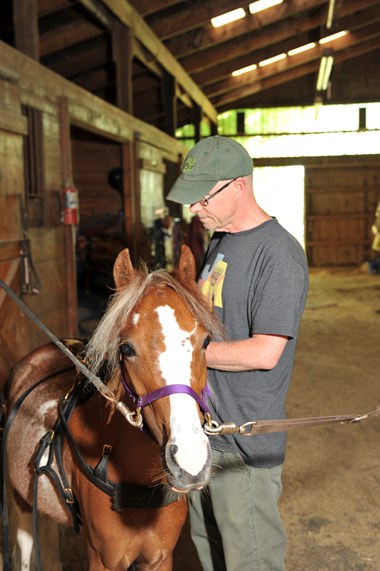We horse people are a curious lot. Joy is found in mundane chores. Every season brings its peculiar challenges of mucking out stalls, feeding, cleaning water buckets, polishing tack, grooming, and working with our animals. We complain about the weather, but never resent time spent at the stable, whatever the temperature.
Barn visits are safe harbors, vivifying time away from family and work, solely for us. Our relationship to horses is existential, providing continual opportunities for learning more deeply about ourselves. We train to be better equestrians, while aspiring to become the person we want to be.
Progress in the training arena is slow. Putting in daily time and effort is required; inconsistency is frustrating for humans and equines alike. Setbacks are constant. Coaching refines and refreshes intentionality. Moments we are in sync, while fleeting, are fulfilling and affirming. A good drive with my pony sustains me for days.
Fear is a curious companion for all, from the new lesson kid to the most experienced adult. We think we are in control of these noble creatures, but at any surprise, survival instinct can spook the most refined genetics and conditioned behavior, resulting in crow-stepping, rearing, bucking and bolting.
All of us struggle with anxiety after an accidental fall. And the longer it festers, the more debilitating. It took weeks for me to settle back into the cart after a driving incident. The pony was fine; I was skittish. With support from barn mates and my trainer, I went back to the basics and began again—becoming a better driver.
Improvement is always needed. Coaches ask, “What do you want to work on?” then break down success into minute calibrations of achievable results. Giving one quarter inch more of rein relaxes and straightens out my animal. Small postural adjustments for me also have seismic positive consequences.

I have been at the same barn for seven years, long enough to watch lesson kids become confident teens, and the older kids graduate college, all the while deepening connections to the adult boarders. Our successes and frustrations here inform relationships with family, friends, and colleagues.
Showing up and being fully present is equally beneficial at work and at home. Goal setting and overcoming fear is important. Patience and persistence pays off. Seeking advice and recalibration essential. Nurturing and challenging ourselves throughout life, we need to begin again and again to thrive.
About the Author
John R. Killacky is executive director of Flynn Center for the Performing Arts in Burlington, VT.



 June 9, 2017
June 9, 2017 





















